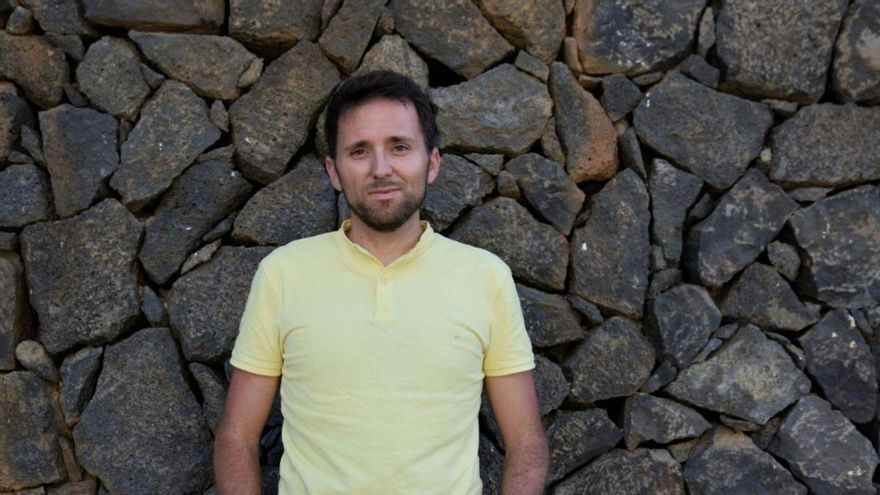
What is a floating signifier? Why is the Canary Islands so?
As the philosophers Chantal Mouffe and Ernesto Laclau put it, the way we use language lets us know that words do not have eternal meanings. The same term can symbolize different things or lose its meaning and get lost in time. When a signifier, such as Canarias, aspires to define an entire society, the attempts by its members to attribute meanings to it show a struggle for what it should be and what it should not. In this struggle, the positions of power of those who try to speak on their behalf emerge. Canarias is, in this sense, a floating signifier because different meanings compete to establish what its name should refer to. That is why it can be said that their senses float, because what the Canary Islands represents can never be fully fixed.
The desire of some for the Archipelago to “float”, especially in geopolitical terms, towards Europe and America is evident…
Indeed, we have proof that the Canary Islands are a floating signifier in the amazing ability of those who speak on their behalf to deny their geography, obviously African. Certain sectors do not like or do not like the place that the Archipelago occupies on the maps, and prefer to refer to it as the ultraperiphery of Europe, when not as an enclave recognizable by its Atlantic nature. With this, a vision of the Islands is imposed whose immediate reality is denied in order to keep intact our role as the vanguard of Western neo-colonialism, especially in Africa.
What is the cause of so much fluctuation when it comes to defining the Islands?
Look: this is determined by the very modern and colonial genesis of the territory. We belong to a society that has been and continues to be profoundly unequal. The way, therefore, in which we conceive our reality depends on the place that each one occupies in their forms of organization of work and wealth, among other manifestations of social antagonism.
Is the experience of people who occupy such different positions in their social hierarchy comparable?
It is to the extent that, I insist, we all participate in the process of constructing meanings that try to define the Canary Islands. Obviously, the ability to influence this process of people who have just arrived on the islands of continental Africa or Latin America, especially if they do so in precarious conditions, is less than that of migrants who come from Europe or residents with a position more or less accommodated. A priori, it seems easier for the vision of the Archipelago sponsored by those at the top of their society to prevail than that of its working classes, despite the fact that the latter group is much more numerous. The possibility, however, of overflowing that hegemony is real. Speaking in the Name of the Canary Islands always presupposes conflict.
But that does not prevent a certain way of speaking from being imposed in the Name of the Canary Islands.
Of course. Currently, the signifier Canarias functions as a cover name for the power held by certain social groups through the representation of the Archipelago through euphemisms such as its insularity, Atlanticness and the denial of its differences in class, sex/gender, race and knowledge… But that situation You can change.
Could you explain the role played in the Archipelago, according to your analysis, by the myth of insularity?
There is a long tradition in the Canary Islands that insists on attributing unalterable features to the fact that we inhabit an island space. From the seminal works of Ángel Valbuena Prat and María Rosa Alonso to the most recent contributions of Juan José Delgado or Andrés Sánchez Robayna, insularity has been defined as something more than a geographical context, that is, as an essence that conditions any demarcation of the canary Authors such as Claude Le Bigot, Daniel Barreto or Paula Fernández-Hernández have reacted to this tradition, who consider that reducing canarity to its geophysical context implies trivializing and exoticizing its reality. As Nilo Palenzuela states in this regard, this type of argument turns geography into pure metaphysics. And, in the end, what lies behind the myth is the estrangement inherent in the continental gaze that the West imposes on the insular.
In the Canary Islands, as you say, nothing ever happens until it happens?
So it seems. The original quote is from the Puerto Rican writer José Luis González. It alludes to the ideological fantasy that insists on presenting the Islands as a territory free of social conflict. It is, obviously, a stereotyped way of speaking in the Name of the Canary Islands but it is useful for the colonial-style narratives from which the tourist business is nourished, without going any further. In turn, this false sense of peace also functions as a tool that island elites use to maintain the status quo. However, there is no evil that lasts a hundred years or hegemony that resists it without making concessions.
Has fourth wave feminism had any impact on the Islands?
I think so. In fact, I would dare to say that this is one of the spaces from which they struggle most strongly to transform their reality. In recent years in the Canary Islands, the demands for real equality and the rights of the LGTBIQ+ collective have not stopped growing. It is also noteworthy that her activism embraces perspectives as interesting as decolonial feminism, which questions patriarchal domination based on the role it plays, along with sex, race and class. In the field of research, these advances are inseparable from the work of, among others, Jessica Pérez, José Ramos Arteaga, Larisa Pérez, Nilsa Perdomo and Daniasa Curbelo.
Could it be affirmed that there is racism in contemporary Canarian society?
Of course. The modern foundation of the Canary Islands is a pioneer in the application of what we now call coloniality. This concept defines the pattern of capitalist power that makes possible the racialization of the bodies that have inhabited the Archipelago since its conquest. Based on a regime that oscillates between oppression and privilege, coloniality has legitimized the island’s social order for the last six centuries. And, just as it justified slavery in the 16th century, it can explain in the 21st century why almost half of its population is at risk of poverty and social exclusion.
And the Guanches, do they paint something in that process?
As I point out in the book The Ghosts of the Guanches (2019), the indigenous islanders are the first human group in the Canary Islands to suffer the effects of coloniality. This legitimizes their capture and sale as slaves, the military actions that take away control of the territory and its resources, and the persecution of their ways of life and knowledge, thus forcing the integration of those who survive, mostly women, to join the new society. A similar process is repeated with the population contingent of Moors and blacks brought to the Islands for the benefit of the European colonizers, among whom certain forms of inequality also reign. Perhaps that is why the spectral heritage of the ancient islanders is still useful for those who advocate, in the Name of the Canary Islands, for social justice.
Canary Islands is ignored and ignores that it is ignored?
That’s how it is. I understand, together with Juan Manuel Trujillo, that the knowledge produced in the Canary Islands has been historically devalued. As a result, not only do the people who live here ignore many aspects of our immediate reality, but this lack of definition is also palpable in much of the literature, arts and scientific work produced on the Islands. This is something common, unfortunately, to many colonial territories, condemned to be for another, as the famous Hegelian quote says. That is why it is so necessary to enable epistemic translation mechanisms that make the knowledge that comes from the Islands more accessible, and I am not referring only to their folklore. Putting the cultured and the popular, the ancestral and the academic into dialogue, knowing that none encompasses everything, can be a way to start talking about the Archipelago with an awareness of its plurality.
What are the main conclusions of your work?
When we try to define the limits of something, in this case of Canarian society, we are forced to think about what remains outside its definition. The denial, therefore, of what constitutes us, even if it is through exclusion, is an inseparable part of our identity. In this sense, I value the dark side of Canarian culture as an essential step for its emancipation.
Always in search of the lost canarity…
Without a doubt, but from a perspective that flees from essentialism to claim that Canarian is not only what we think we are, but also what we lack.
However, you say that representing island society is impossible.
It is impossible to represent the Canary Islands as do those who consider that the right to speak on their behalf belongs exclusively to them. But it is feasible to assume that what is displaced towards its margins is also essential for its definition. Making this effort would mean an express renunciation of conceiving the identity of the Archipelago as something immutable.
And so?
Canarias is a floating signifier because it is not possible to represent its reality as a whole. There is always something that is suspicious, something that is missing or does not fit, and in that symbolic precariousness lies its transforming potential.
There are those who think that we are now experiencing a resurgence of identity in the Canary Islands.
And I agree. Before we talked about the specific case of feminism in the Islands, but there is also an increase in concern about the poor conditions in which a large part of the population lives, the destruction of nature, geopolitical instability or the rise of racism. And this happens because the reigning hegemony in the territory for decades has cracked. It depends on our expertise to resignify these cracks that the name of the Canary Islands is put at the service of its social majority.
We are condemned, therefore, to live in antagonism
It seems that way, because this is a constant, an inherent trait of life in society. Marx said that social antagonisms are the result of the natural laws of production. With this book I hope to demonstrate that the production of meaning is inseparable from the way in which our material life is organized.
















